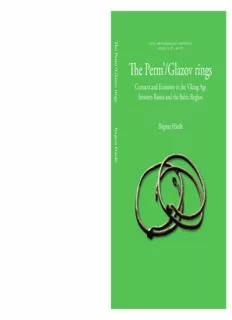
The Perm’/Glazov Rings: Contacts and Economy in the Viking Age between Russia and the Baltic Region PDF
Preview The Perm’/Glazov Rings: Contacts and Economy in the Viking Age between Russia and the Baltic Region
Th acta archaeologica lundensia series in 8°, no 67 e P e r m Ag roup of distinctive Viking Age silver rings, sometimes described The Perm’/Glazov rings ’ / as neck-rings, sometimes as arm-spirals, have long been a cause of G l academic dispute. Where were they made and how were they used? a z o So far the scholarly perspectives have been limited to either the western or the v Contacts and Economy in the Viking Age eastern material, which has hampered interpretations. r i n between Russia and the Baltic Region This book deals with a greater number of these rings than hitherto, mainly g s dated to the 9th century, retrieved in present-day Russia, the Baltic region and Scandinavia. By analysing them it is possible to elucidate and discuss questions of contacts, economy and also craft traditions in the early Viking Age. It is especially worth noticing that these rings also seem to have been Birgitta Hårdh B made according to distinct weight groups, which can also be associated with ir g ancient weight systems. Obviously they are to be seen as value denominations it t a or means of payment in large units. The similarity between rings in east and H west indicates close relations between Scandinavia/the Baltic Region and the å r d interior of Russia. This can probably be explained by the well-developed fur h trade, aimed ultimately at the markets in the Abbasid caliphate and Byzantium. Only by considering the collected material in the east as well as in the west has it been possible to discuss interpretations of them. Acta Archaeologica Lundensia Series altera in 8° can be ordered via Lund University: http://www.ht.lu.se/en/serie/aals8/ ACTA ARCHAEOLOGICA LUNDENSIA SERIES IN 8°, No. 67 ACTA ARCHAEOLOGICA LUNDENSIA SERIES IN 8°, No. 67 Birgitta Hårdh The Perm’/Glazov rings Contacts and Economy in the Viking Age between Russia and the Baltic Region Published with grants from Kungl. Vitterhets Historie och Antikvitets Akademien, Gyllenstiernska Krapperupstiftelsen and Birgit och Gad Rausings stiftelse för Humanistisk Forskning. Cover: Rings from Pan’kovka, Perm obl. GE 546:1–2 © Institutionen för Arkeologi och Antikens Historia Graphic design: Stilbildarna i Mölle/Frederic Täckström Print: Elanders Fälth & Hässler 2016 Acta Archaeologica Lundensia Series altera in 8° can be ordered via Lund University: http://www.ht.lu.se/en/serie/aals8/ E-mail: [email protected] isbn 978-91-89578-70-8 issn 0065-0994 Contents 9 Strange birds in Scandinavian Viking Age? 13 The Baltic/Scandinavian record 19 The Russian record 33 Comparison of rings from east and west 34 Long-distance trading networks 35 The Kama and Čepca regions 39 Graffiti on rings and coins 45 “Permian” rings and Duesminde rings 49 Weight systems in east and west 53 The weight of complete rings 57 Silver analyses 58 Weight-adjusted ingots in east and west 61 Gotlandic bangles and “money” spirals 63 Relation between Perm’/Glazov rings, Duesminde rings, weight-standardized ingots and spiral rings 63 Concluding discussion 67 Abbreviations 67 References Preface This text has been on its way for quite a long Denmark, Copenhagen. It has always been time. Back in the 1970s, when working on very agreeable to work in the stores of those the Viking Age silver hoards from Southern museums. I thank you all for your kindness, Sweden, I was fascinated by a group of small help and not least tea and coffee. striated clipped rods. They derived from For the meticulous archaeometallurgical so-called Permian rings, which supposedly analysis with really interesting results I thank have their origin in the distant Perm’ dis- Eva Hjärthner-Holdar and Lena Grandin, trict close to the Ural Mountains. In search Geoarchaeological Laboratory. of information on these rings I have visited Financial support for language editing, a number of museums in Russia, the Baltic layout and printing has been generously region and Scandinavia and have had the provided by Kungl. Vitterhets Historie och privilege to study the collected material. Antikvitets Akademien and Gyllenstiernska First of all I would like to thank Nikolaj Krapperupstiftelsen. Support for the archaeo- Andrevich Makarov. Without your support metallurgical analyses was granted by Birgit and encouragement through years this book och Gad Rausings stiftelse för Humanistisk would never have been realized. To Johan Forskning. Kungl. Vitterhets Historie och Callmer for your scrupulous reading of my Antikvitets Akademien has also awarded manuscript and important comments which grants for my travels to Russia. fundamentally improved the text and also My warmest thanks to Alan Crozier for rescued med from some traps. To Christoph revising my English and to Frederic Täck- Kilger, also for reading my manuscript and ström for the layout work. It is always a for valuable comments. pleasure to work with you. I would also like to express my sincere Thanks also to Johannes Edvardsson for thanks to colleagues and friends at the State help with a map and last but not least to Historical Museum, Moscow, the State Her- Kjell Edvardsson for lots of support and mitage Museum, St Petersburg, the Swed- infinite patience. ish History Museum, Stockholm, Gotlands Lund, October 2016 Fornsal, Visby, the National Museum of Fin- Birgitta Hårdh land, Helsinki, and the National Museum of 7
Description: